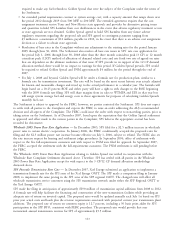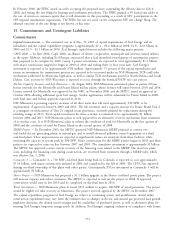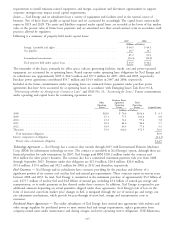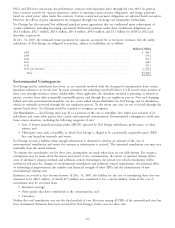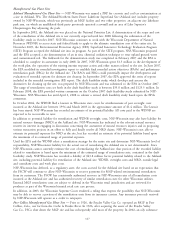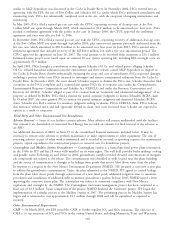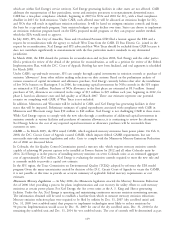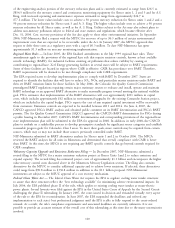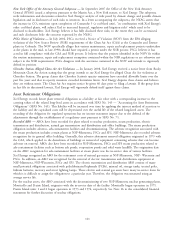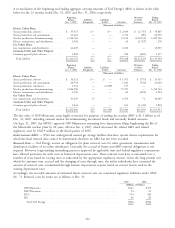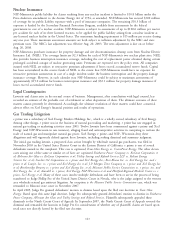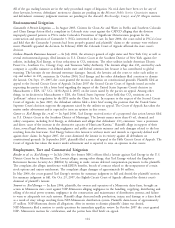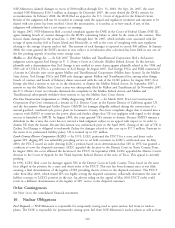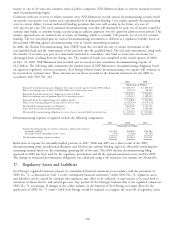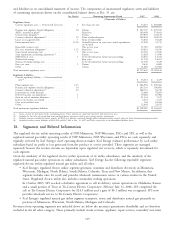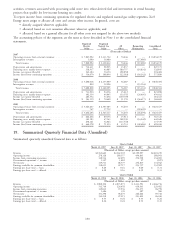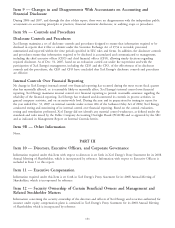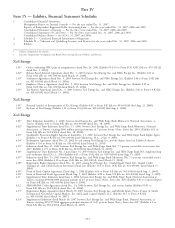Xcel Energy 2007 Annual Report Download - page 133
Download and view the complete annual report
Please find page 133 of the 2007 Xcel Energy annual report below. You can navigate through the pages in the report by either clicking on the pages listed below, or by using the keyword search tool below to find specific information within the annual report.Nuclear Insurance
NSP-Minnesota’s public liability for claims resulting from any nuclear incident is limited to $10.8 billion under the
Price-Anderson amendment to the Atomic Energy Act of 1954, as amended. NSP-Minnesota has secured $300 million
of coverage for its public liability exposure with a pool of insurance companies. The remaining $10.5 billion of
exposure is funded by the Secondary Financial Protection Program, available from assessments by the federal
government in case of a nuclear accident. NSP-Minnesota is subject to assessments of up to $100.6 million per reactor
per accident for each of its three licensed reactors, to be applied for public liability arising from a nuclear incident at
any licensed nuclear facility in the United States. The maximum funding requirement is $15 million per reactor during
any one year. These maximum assessment amounts are both subject to inflation adjustment by the NRC and state
premium taxes. The NRC’s last adjustment was effective Aug. 20, 2003. The next adjustment is due on or before
Aug. 20, 2008.
NSP-Minnesota purchases insurance for property damage and site decontamination cleanup costs from Nuclear Electric
Insurance Ltd. (NEIL). The coverage limits are $2.3 billion for each of NSP-Minnesota’s two nuclear plant sites. NEIL
also provides business interruption insurance coverage, including the cost of replacement power obtained during certain
prolonged accidental outages of nuclear generating units. Premiums are expensed over the policy term. All companies
insured with NEIL are subject to retroactive premium adjustments if losses exceed accumulated reserve funds. Capital
has been accumulated in the reserve funds of NEIL to the extent that NSP-Minnesota would have no exposure for
retroactive premium assessments in case of a single incident under the business interruption and the property damage
insurance coverage. However, in each calendar year, NSP-Minnesota could be subject to maximum assessments of
approximately $15.0 million for business interruption insurance and $32.1 million for property damage insurance if
losses exceed accumulated reserve funds.
Legal Contingencies
Lawsuits and claims arise in the normal course of business. Management, after consultation with legal counsel, has
recorded an estimate of the probable cost of settlement or other disposition of them. The ultimate outcome of these
matters cannot presently be determined. Accordingly, the ultimate resolution of these matters could have a material
adverse effect on Xcel Energy’s financial position and results of operations.
Gas Trading Litigation
e prime was a subsidiary of Xcel Energy Markets Holdings Inc., which is a wholly owned subsidiary of Xcel Energy.
Among other things, e prime was in the business of natural gas trading and marketing. e prime has not engaged in
natural gas trading or marketing activities since 2003. Twelve lawsuits have been commenced against e prime and Xcel
Energy (and NSP-Wisconsin in one instance), alleging fraud and anticompetitive activities in conspiring to restrain the
trade of natural gas and manipulate natural gas prices. Xcel Energy, e prime, and NSP- Wisconsin deny these
allegations and will vigorously defend against these lawsuits, including seeking dismissal and summary judgment.
The initial gas trading lawsuit, a purported class action brought by wholesale natural gas purchasers, was filed in
November 2003 in the United States District Court in the Eastern District of California. e prime is one of several
defendants named in the complaint. This case is captioned Texas-Ohio Energy vs. CenterPoint Energy. The other eleven
cases arising out of the same or similar set of facts are captioned Fairhaven Power Company vs. EnCana Corporation et
al; Ableman Art Glass vs. EnCana Corporation et al; Utility Savings and Refund Services LLP vs. Reliant Energy
Services Inc. et al; Sinclair Oil Corporation vs. e prime and Xcel Energy Inc.; Ever-Bloom Inc. vs. Xcel Energy Inc. and e
prime et al; Learjet, Inc. vs. e prime and Xcel Energy Inc et al; J.P. Morgan Trust Company vs. e prime and Xcel Energy Inc.
et al; Breckenridge Brewery vs. e prime and Xcel Energy Inc. et al; Missouri Public Service Commission vs. e prime, inc. and
Xcel Energy, Inc. et al; Arandell vs. e prime, Xcel Energy, NSP-Wisconsin et al and Hartford Regional Medical Center vs. e
prime, Xcel Energy et al. Many of these cases involve multiple defendants and have been or are in the process of being
transferred to Judge Phillip Pro of the United States District Court in Nevada, who is the judge assigned to the western
area wholesale natural gas antitrust litigation. An exception is the Missouri Public Service Commission case, which was
remanded to Missouri state court in November 2007.
In April 2005, Judge Pro granted defendants’ motion to dismiss based upon the filed rate doctrine in Texas Ohio
Energy. Based upon this same legal doctrine, Judge Pro subsequently granted defendants’ motion to dismiss in Fairhaven
Power Company, Ableman Art Glass and Utility Savings and Refund Services. Plaintiffs subsequently appealed these
dismissals to the Ninth Circuit Court of Appeals. In September 2007, the Ninth Circuit Court of Appeals reversed the
dismissal and remanded the lawsuits to Judge Pro for consideration of whether any of plaintiffs’ claims are based upon
retail rates not directly barred by the filed rate doctrine.
123


